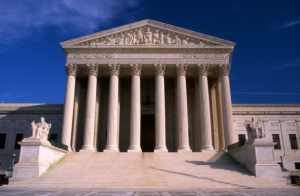
by Wilton H. Strickland
Perhaps one of the most effective tools for discouraging violations of our civil rights is 42 U.S.C. § 1983 (“Section 1983”), a statute that empowers us to file a lawsuit and recover damages for such violations. What makes this remedy particularly effective is the ability to recover attorneys’ fees as provided in 42 U.S.C. § 1988, thereby enabling the pursuit of meritorious claims despite a lack of financial resources.
There tends to be confusion, however, over what makes for a valid 1983 claim, especially where the defendant is a private citizen rather than a government employee. The prospect of large damages awards and attorneys’ fees can generate an equally large number of defective 1983 claims that will not survive dismissal, so it is worthwhile to review what a meritorious claim against a private citizen looks like.
To state a Section 1983 claim, the plaintiff must allege that the defendant 1) deprived the plaintiff of a right secured by the U.S. Constitution while 2) acting under color of state law. See Collins v. Womancare, 878 F.2d 1145, 1147 (9th Cir. 1989). The second requirement is difficult to satisfy if the defendant is a private citizen, for “[o]nly in rare circumstances can a private party be viewed as a ‘state actor’ for section 1983 purposes.” Rayburn v. Hogue, 241 F.3d 1341, 1347 (11th Cir. 2001). Indeed, purely private conduct, no matter how discriminatory or wrongful, does not establish liability under Section 1983. See Focus On The Family v. Pinellas Suncoast Transit Auth., 344 F.3d 1263, 1276-77 (11th Cir. 2003).
How A Private Citizen Can Become A “State Actor”
That’s not to say that a private citizen can never be held liable for violating Section 1983. Three alternative tests have evolved to determine whether a private citizen might be considered a state actor for purposes of Section 1983, as follows:
1) The public function test;
2) The state compulsion test; or
3) The nexus/joint action test
See Focus On The Family, 344 F.3d at 1277 (citation omitted).
The public function test hinges on whether a defendant was performing a function “traditionally the exclusive prerogative of the state.” Id.
The state compulsion test inquires whether the government has coerced or “significantly encouraged” a defendant to engage in the complained-of conduct. Id.
The nexus/joint action test applies where “the state has so far insinuated itself into a position of interdependence with the [defendant] that it was a joint participant in the enterprise.” Id. With regard to this last test, a court will examine whether the government and the defendant are “intertwined in a symbiotic relationship,” as well as whether the relationship involves “the specific conduct of which plaintiff complains.” Id.
While these tests can be fact-intensive and often require discovery to flesh out, a complaint nevertheless will be dismissed if it makes only conclusory allegations of an improper relationship between a defendant and the government. See Lehman v. Scott, 2009 WL 1228433, at *3 (M.D. Fla. May 4, 2009) (“‘[M]ore than mere conclusory notice pleading is required in civil rights and conspiracy actions.’”) (citation omitted); Harvey v. Harvey, 949 F.2d 1127, 1133 (11th Cir. 1992) (“For purposes of [Section 1983], the plaintiff must plead in detail, through reference to material facts, the relationship or nature of the conspiracy between the state actor(s) and the private persons.”).
For example, a complaint alleging that doctors conspired with governmental authorities to have the plaintiff involuntarily committed was properly dismissed, since the complaint did not illustrate specific contacts among the defendants and “consist[ed] of purely conclusory allegations that do not plead conspiracy sufficiently to transform the [private] defendants into state actors.” Harvey, 949 F.2d at 1133 (affirming dismissal). A complaint alleging that a car-rental company falsely reported to the police that plaintiff had stolen a car was properly dismissed, since the complaint did not satisfy any of the three tests for making private defendants liable under Section 1983. Wilson v. Dollar-Thrifty Auto Group-South Fla. Transport, 286 Fed. Appx. 640, 642 (11th Cir. 2008) (affirming dismissal). And a complaint alleging that several bounty hunters violated the rights of a plaintiff when arresting him was dismissed, despite the fact that bounty hunters derive a portion of their authority from the state government:
[T]his Court finds that the Defendants were not state actors for purposes of § 1983 when they attempted to effect the arrest of [plaintiff]. Although their authority to arrest the plaintiff derived from the State of Florida, the Amended Complaint is bereft of allegations indicating that they received instructions, directions, aid, comfort, succor, or anything else from the State in pursuing their principal. . . . The fact that the State of Florida qualifies, licenses, and appoints its bail bondsmen is unavailing. If that were the litmus test, then doctors, engineers, lawyers, private investigators, and even concealed weapons holders would be considered state actors violating the proscription that “[o]nly in rare circumstances can a private party be viewed as a ‘State actor’ for section 1983 purposes.”
Green, 316 F. Supp. 2d at 1261-62 (citations omitted).
In short, allegations that a private citizen became a “state actor” must be clear, specific, and demonstrate a very close relationship between the defendant and the state.
Caveats
There are some traps and pitfalls for the unwary when asserting a 1983 claim.
First, Section 1983 creates a remedy against state officials, not federal ones. If you seek a remedy against a federal official for violating your constitutional rights, you can assert a so-called Bivens action under the Supreme Court’s decision of Bivens v. Six Unknown Named Agents, 403 U.S. 388 (1971).
Second, there is no vicarious liability or respondeat superior in this context, so it is not possible to assert a valid 1983 claim merely because a defendant employed someone who indeed committed a violation. In other words, liability arises from the defendant’s own wrongful conduct, not someone else’s. See Connor v. Halifax Hosp. Med. Ctr., 135 F. Supp. 2d 1198, 1210 (M.D. Fla. 2001).
Third, a private citizen’s mere request to a governmental official does not create liability under Section 1983. See Woods v. Valentino, 511 F. Supp. 2d 1263, 1274 n.19 (M.D. Fla. 2007) (“If the Plaintiff’s argument were taken as true, then any time any person ever filed a police report, made a criminal complaint against another person, or attempted to protect his or her rights in court, that person would become a state actor.”); Lehman, 2009 WL 1228433, at *3 (“It is well established . . . that a private citizen does not engage in joint action with a state actor simply by calling upon official state authority or furnishing information to police officers (even if that information is factually incorrect).”). This principle applies to courts of law, meaning that a request for judicial action does not on its own create liability under Section 1983. See Harvey, 949 F.2d at 1134-35 (“Use of the courts by private parties does not constitute an act under color of state law.”) (citations omitted); see also Woods, 511 F. Supp. 2d at 1274 n.19 (“If the Plaintiff’s argument were taken as true, then any time any person ever . . . attempted to protect his or her rights in court, that person would become a state actor.”).
And fourth, an allegation that a private citizen violated state law is self-defeating, since the essence of a 1983 claim is that the defendant acted under state authority. See Roudybush v. Zabel, 813 F.2d 173, 177 (8th Cir. 1987); Harper v. Fed. Land Bank of Spokane, 878 F.2d 1172, 1178 (9th Cir. 1989).
I made this last argument successfully in Salminen v. Morrison & Frampton, PLLP, CV-11-57-M-DWM (D. Mont. 2011), where the plaintiffs alleged that a private attorney violated Montana procedures for executing on a money judgment. Taking the plaintiffs’ allegation as true for purposes of argument, I persuaded the court that there was no valid claim under Section 1983 because the attorney couldn’t possibly have been acting under color of state law if he had violated it, and the court dismissed.
Conclusion
Section 1983 is an important tool that discourages abuses of civil rights and creates a remedy for people who suffer them. At the same time, it’s important to remember that governments, not private citizens, have the power to violate civil rights; only by donning the mantle of government authority can a private citizen become a state actor and be named as a Section 1983 defendant.


